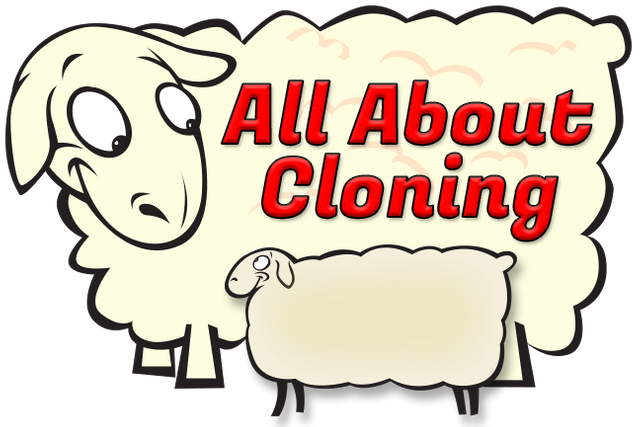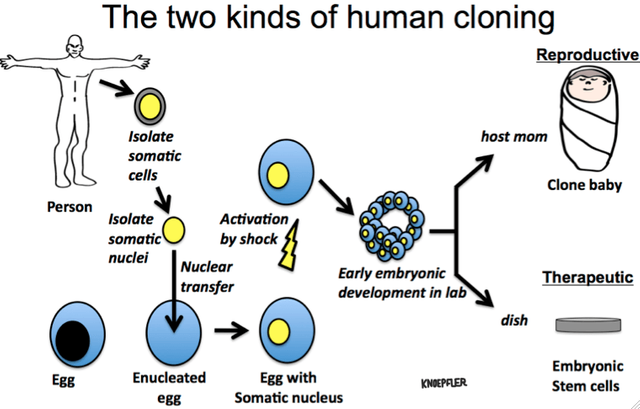I've been sitting on this post for a while now as this is something that has I have always found very interesting. I have been doing quite a bit of research and this made me even more curious. I haven't actually thought about a timeline for cloning, but it turns out that research on cloning had already started in the 1970's, and the first mammal (a sheep named "Dolly"), was cloned only in 1997 by Scottish scientists. Since then, several other mammals such as mice, pigs, dogs, rabbits and cows have been cloned. Cloning has become a popular subject, but my mission was about finding out precisely what it entails.

Cloning may be described as a method of non-sexual reproduction of an organism. More specifically, an identical copy of another organism is duplicated, by means of it's genes. To me it seems like making a "photocopy" of something that is made from the same "material", but is not necessarily identical.
There are different forms of cloning, but the one that has been referred to above is called reproductive cloning and is achieved by means of biotechnological procedures in a laboratory. If you are interested in reading about the different forms of cloning, you can find it here.
Reproductive cloning is a technology used to generate an animal that has the same nuclear DNA as another currently or previously existing animal.
From what I understand, the most common way to clone is to take the nucleus from a body cell and transfer it into a female egg cell from which the nucleus have been removed. The cloned embryo is then stimulated electrically or chemically and begins to divide and develop like an ordinary fertilized embryo.
In biology, cloning is the process of producing similar populations of genetically identical individuals that occurs in nature when organisms such as bacteria, insects or plants reproduce asexually.
Although there has been many attempts in cloning humans, at this stage, it has not been reliably confirmed that there has been any successful results. Can you imagine how interesting it would be to have a conversation with a clone? I wonder what they would be like.
Human cloning, just like issues such as abortion, remains very controversial. According to the advocates of cloning, the advantages include the possibility that couples who are unable to conceive children could have their own offspring. However, people opposing human cloning argue that cloning is far from being perfected and that there is a high risk of miscarriages, stillborn babies and malformed or disabled children. (The cloned sheep Dolly, was born only after nearly 300 unsuccessful attempts.)
There are many potential medical benefits as well. For example, women who cannot make healthy eggs could use this technology to ensure healthy offspring. Many scientists believe that stem cells can not only provide a ready supply of replacement tissue but also may hold the key to developing more effective treatments for common disorders such as heart disease and cancer as well as degenerative diseases such as Alzheimer's and Parkinson's. Researchers believe that in the future it may be possible to induce stem cells to grow into complete organs.
It is also a point of concern that in humans, psychological characteristics such as intellect and emotions are much more important than in animals and that cloning could have disastrous effects in this important area of functioning. Until more research progress has been made, human cloning should be regarded as extremely risky and professional-ethically unacceptable.

I would like to do even more research about this, and would appreciate any pointers from others who have already acquired knowledge about cloning.
Bibliography:

Hi! I am a robot. I just upvoted you! I found similar content that readers might be interested in:
http://www.encyclopedia.com/science-and-technology/biology-and-genetics/biology-general/cloning
Downvoting a post can decrease pending rewards and make it less visible. Common reasons:
Submit
Thanks @cheetah, but this link is mentioned under my Bibliography as resource
Downvoting a post can decrease pending rewards and make it less visible. Common reasons:
Submit
What is the deal with @cheetah bot anyway? 4 out of 5 times I see that stupid bot on somebody's comments it's referencing a source the author already cited. Furthermore, it seems to consistently crop up on the especially-taboo tags or buzzwords (vaccines, Zionism, human cloning, etc.)
Maybe it's just some coincidence-lasagna that every time I see cheetah bot, it's hassling an author who already cited their sources. But am I the only one who finds this bot insanely annoying? Because I do.
Interesting post though! I was 12 when they successfully cloned Dolly the sheep, so I remember it making the news. However, the fact that it took 300 failed attempts wasn't in the headlines. ;op
Downvoting a post can decrease pending rewards and make it less visible. Common reasons:
Submit
Congratulations! This post has been upvoted from the communal account, @minnowsupport, by ghostgtr from the Minnow Support Project. It's a witness project run by aggroed, ausbitbank, teamsteem, theprophet0, someguy123, neoxian, followbtcnews/crimsonclad, and netuoso. The goal is to help Steemit grow by supporting Minnows and creating a social network. Please find us in the Peace, Abundance, and Liberty Network (PALnet) Discord Channel. It's a completely public and open space to all members of the Steemit community who voluntarily choose to be there.
Downvoting a post can decrease pending rewards and make it less visible. Common reasons:
Submit